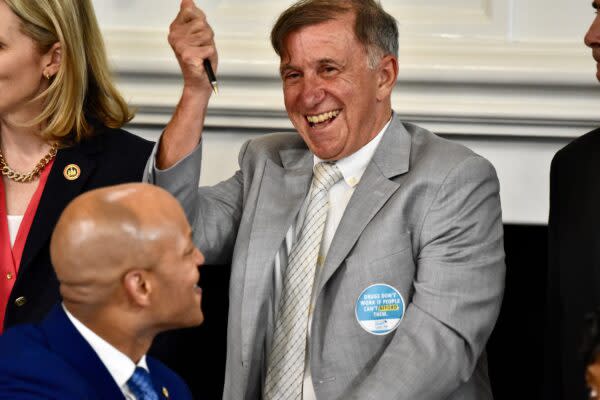Blanca Garcia-Martinez, mother of slain parole agent Davis Martinez, attends an event for the signing of a bill, named after her son, to boost protections for state workers. (Photo by Bryan P. Sears/Maryland Matters)
Family, loved ones and colleagues of Davis Martinez gathered in Annapolis Tuesday for a bittersweet occasion – to witness the signing of a law named to honor the slain parole agent’s memory by boosting protections for state workers.
“His family and his loved ones turned that pain into purpose,” Gov. Wes Moore (D) said before signing the Davis Martinez Public Employee Safety and Health Act. “They came to Annapolis to advocate the legislation that would help ensure what happened [to Martinez] would never happen again.”
It was just one of 181 bill signed into law Tuesday in the final bill signing session after a challenging 2025 legislative session. The measures ranged from the mundane to the major — the fiscal 2026 budget — and included moments of personal reflection from House Speaker Adrienne Jones (D-Baltimore County) and pure elation from long-suffering advocates finally seeing victory.
Martinez became the first parole agent killed in the line of duty when he was brutally slain on the morning of May 31, 2024, while making a routine check on a parolee at a home in Silver Spring.
Martinez’s supervisors did not check on him until well into the evening, after coworkers noticed him missing and expressed concern for his well-being. Police found Martinez dead with multiple stab wounds at the home of the parolee, Emanuel Edward Sewell, who was arrested a day later in West Virginia and has since been charged with first-degree murder in Martinez’s death.
Martinez’s family and labor unions called on the legislature to boost protections for state employees in the wake of the killing, which led to Senate Bill 26 and House Bill 176, which passed with unanimous approval. The legislation, now law, will provide better oversight of state workplaces and create a unit within the Division of Labor and Industry focused on public employee safety and health.
Senate President Bill Ferguson (D-Baltimore City) said Martinez represents thousands of Maryland’s “dedicated state workers that show up to work every single day to serve others.”
“We are so deeply sorry for your loss, and we hope that this piece of legislation … is one small step to honor your loved one’s memory,” he told Martinez’s family.
House Speaker Adrienne Jones (D-Baltimore City) testifying on HB 1253 to create create a state Department of Social Equity in February. (Photo by Danielle J. Brown/Maryland Matters.)
Tuesday’s bill signing began with Moore and legislative leadership looking back on a legislative session filled with challenges – including a multibillion-dollar budget deficit and rapid-fire policy changes at the federal level. In spite of those challenges, Moore signed House Speaker Adrienne Jones’ (D-Baltimore County) bill combining several current state offices to create a new Department of Social and Economic Mobility.
Jones believes that her legislation House Bill 1253 runs “in stark contrast” to the Trump administration’s efforts to eliminate diversity, equity and inclusion programs.
“When we say social and economic mobility, let’s be very clear on what we’re talking about,” Jones said Tuesday. “We’re talking about the strength of our diversity. We’re talking about promoting equity and we’re talking about creating inclusion in all spaces. I’m not afraid to say it.”
She noted that the bill was personal for her as a Black woman.
“I’ve walked on to an unleveled playing field. I’ve been kept out of rooms, meetings and buildings solely because of my race and gender,” she said. “We’ve come a long way since these times … and I refuse to let us go back today.”
Jones extended that promise to Maryland’s immigrant community, much of whome feel unsafe from the Trump administration’s increased deportation efforts on undocumented immigrants.
She highlighted House Bill 1222, which directs the Maryland Attorney General to develop guidelines that clarify how officials at “sensitive locations” — which include public schools, places of worship, courthouses, hospitals and similar locations — should interact with federal immigration enforcement agents.
“The fear felt in Maryland’s immigrant communities is real right now,” Jones said. “Marylanders should feel safe while seeking medical care, pursing education and going to church … But as we see the suspension of the process and as we see a continued erosion of basic human dignity in our immigrant communities, we know this work is far from over.”
The Tuesday bill signing also included the approval of the 2026 budget and a dense energy package, two heavily debated topics over the legislative session. But despite the weighty topics, there were also some moments of celebration during the event.

Vincent DeMarco, president of Maryland Health Care for All, celebrates the governor’s approval of legislation that could help Marylanders save on prescription drug costs. (Photo by Bryan P. Sears/Maryland Matters)
Longtime health care advocate Vincent DeMarco celebrated the governor’s signature on House Bill 424 and Senate Bill 357, which will expand the authority of the state’s current Prescription Drug Affordability Board to help bring prescription drug costs down for all Marylanders. Currently, the board only looks at the cost of drugs for state employee health plans.
During the bill signing, Moore gave a shout-out to DeMarco as someone who “has been a champion for affordable health care for decades.”
DeMarco later said he was “ecstatic” about the board’s expansion.
Moore also signed off on one of his priority bills, to reform the state’s procurement process – a topic that he admitted was “not sexy” but is “absolutely essential in delivering economic growth and building pathways to work, wages and wealth.”
House Bill 500 reworks several parts of the state’s procurement laws to support more minority-owned businesses and veteran-owned businesses, increase oversight of procurements, along with other changes.
Moore said that the bills signed Tuesday were reflective of the hard work the legislature, his administration and advocates put into the bills during the challenging 2025 session.
“We had to be nimble in the face of uncertainty and be courageous in the face of chaos,” Moore said. “If there is one thing we’re able to prove in this session is this: That in Maryland, we can look at challenge squarely in the face and refuse to blink.”
SUPPORT: YOU MAKE OUR WORK POSSIBLE
Read the full article here


